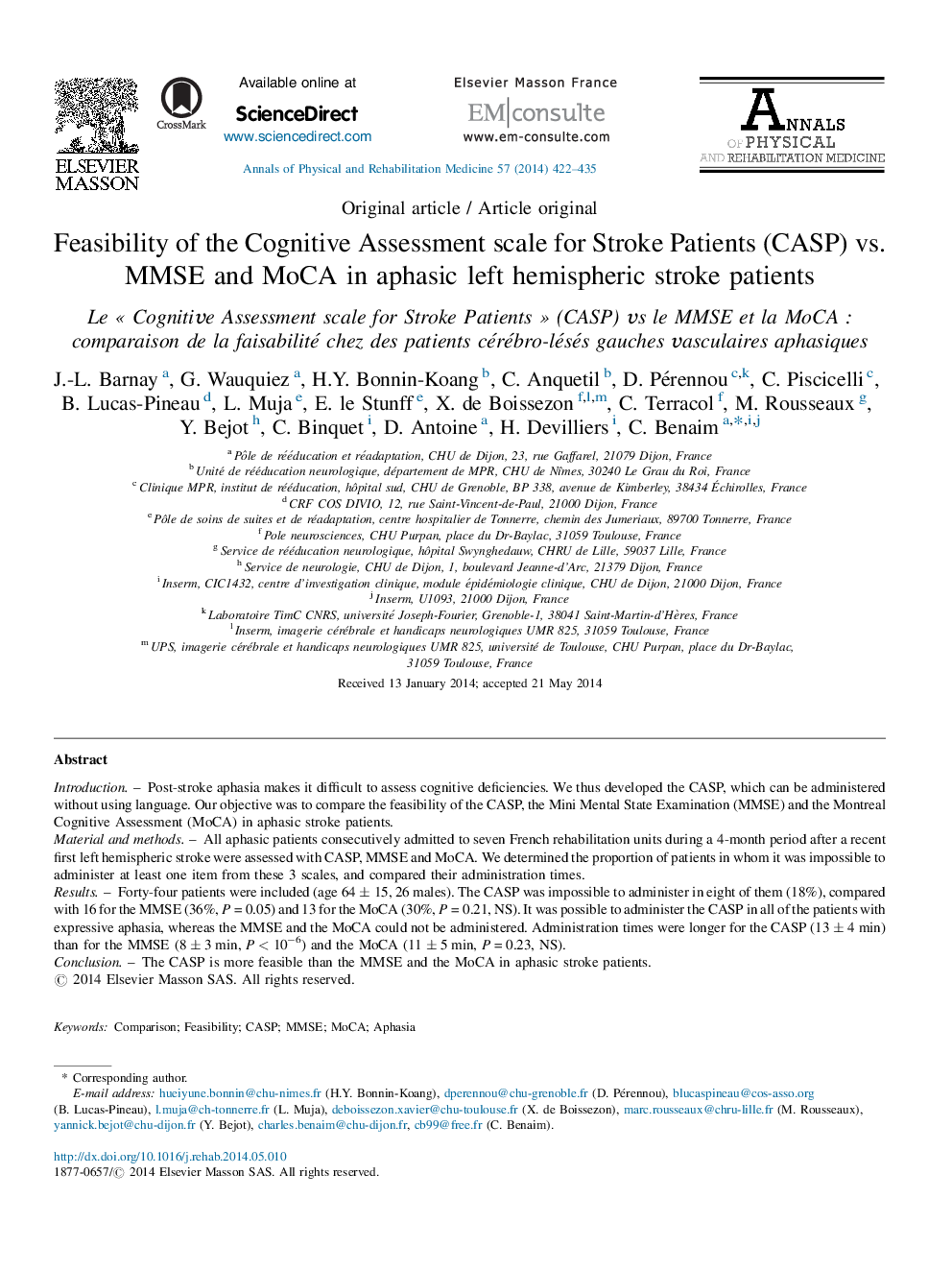| کد مقاله | کد نشریه | سال انتشار | مقاله انگلیسی | نسخه تمام متن |
|---|---|---|---|---|
| 4040534 | 1603306 | 2014 | 14 صفحه PDF | دانلود رایگان |

IntroductionPost-stroke aphasia makes it difficult to assess cognitive deficiencies. We thus developed the CASP, which can be administered without using language. Our objective was to compare the feasibility of the CASP, the Mini Mental State Examination (MMSE) and the Montreal Cognitive Assessment (MoCA) in aphasic stroke patients.Material and methodsAll aphasic patients consecutively admitted to seven French rehabilitation units during a 4-month period after a recent first left hemispheric stroke were assessed with CASP, MMSE and MoCA. We determined the proportion of patients in whom it was impossible to administer at least one item from these 3 scales, and compared their administration times.ResultsForty-four patients were included (age 64 ± 15, 26 males). The CASP was impossible to administer in eight of them (18%), compared with 16 for the MMSE (36%, P = 0.05) and 13 for the MoCA (30%, P = 0.21, NS). It was possible to administer the CASP in all of the patients with expressive aphasia, whereas the MMSE and the MoCA could not be administered. Administration times were longer for the CASP (13 ± 4 min) than for the MMSE (8 ± 3 min, P < 10−6) and the MoCA (11 ± 5 min, P = 0.23, NS).ConclusionThe CASP is more feasible than the MMSE and the MoCA in aphasic stroke patients.
RésuméIntroductionL’aphasie post-AVC rend difficile l’évaluation des autres fonctions cognitives. Nous avons élaboré le CASP qui peut être passé sans utiliser le langage. Nous avons comparé les faisabilités du CASP, du Mini Mental State Examination (MMSE) et de la Montreal Cognitive Assessment (MoCA) chez des patients cérébro-lésés gauches vasculaires aphasiques.Patients et méthodesTous les patients hospitalisés sur une période de quatre mois dans sept services de rééducation français pour premier AVC hémisphérique gauche récent avec aphasie ont été évalués grâce aux trois batteries. Nous avons estimé le pourcentage de patients chez qui la passation d’au moins un item de ces échelles était impossible et comparé leur temps de passation.RésultatsSur quarante-quatre patients inclus (64 ± 15 ans, 26 hommes), 8 (18 %) CASP étaient non réalisables, contre 16 (36 %) MMSE (p = 0,05) et 13 (30 %) MoCA (p = 0,21, NS). Tous les patients avec troubles isolés de l’expression ont pu bénéficier du CASP, aucun des autres batteries. Les temps de passation étaient était plus longs pour le CASP (13 ± 4 min) que pour le MMSE (8 ± 3 min, p < 10−6) et la MoCA (11 ± 5 min, p = 0,23, NS).ConclusionEn termes de faisabilité, le CASP est mieux adapté aux patients aphasiques que le MMSE et la MoCA.
Journal: Annals of Physical and Rehabilitation Medicine - Volume 57, Issues 6–7, August–September 2014, Pages 422–435